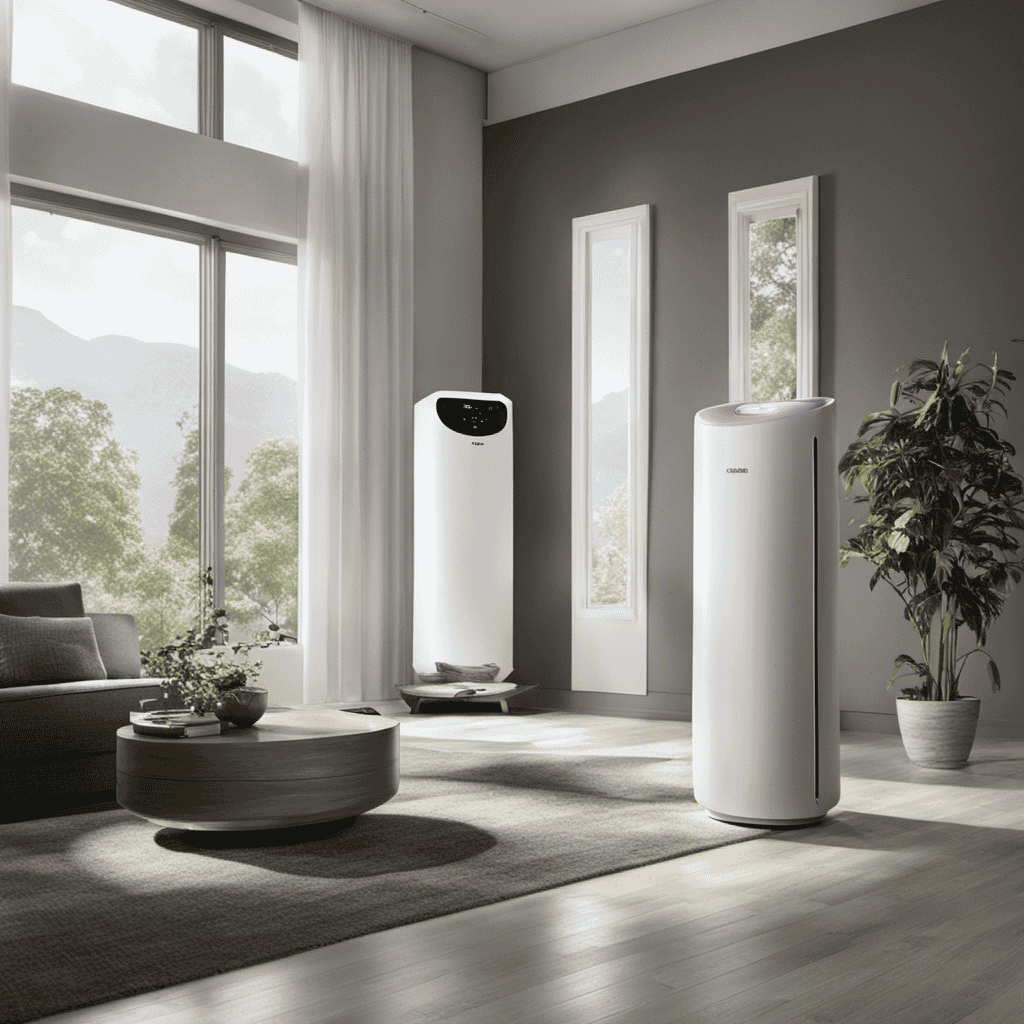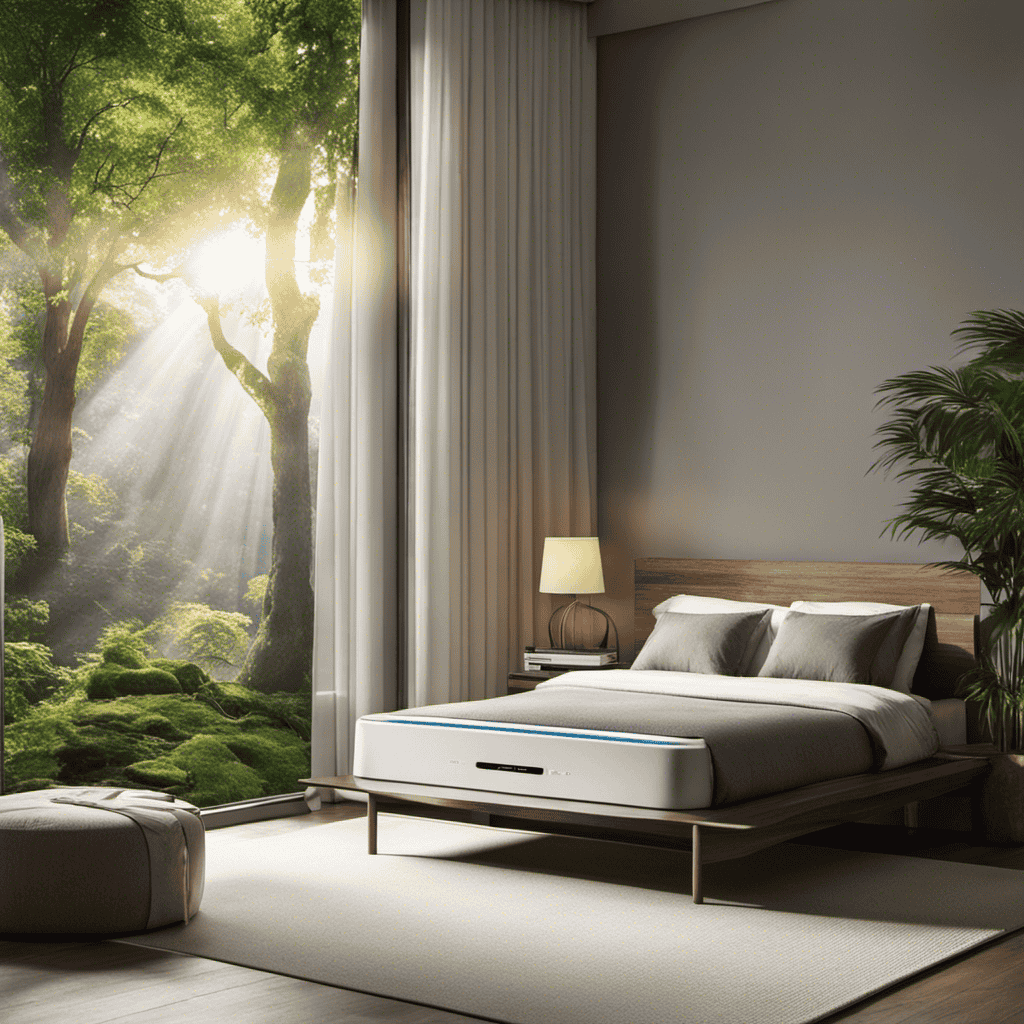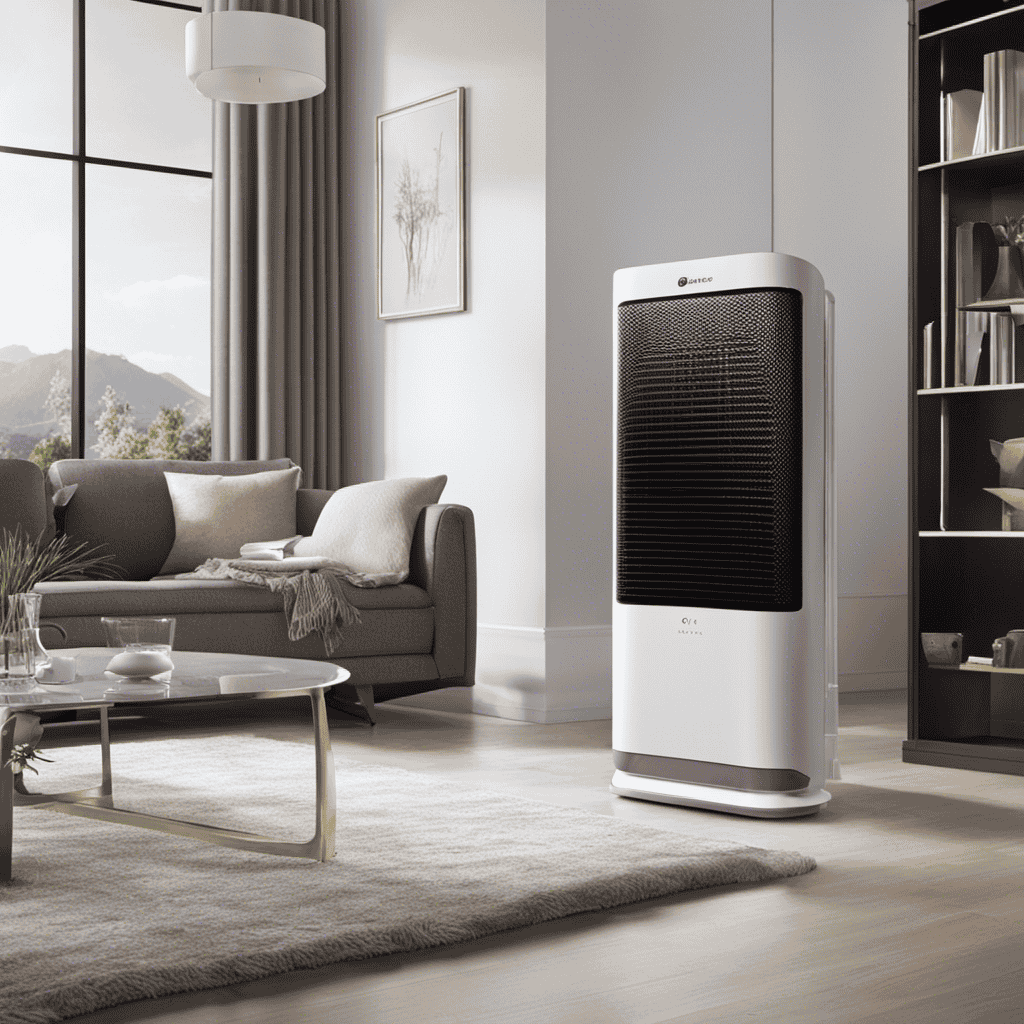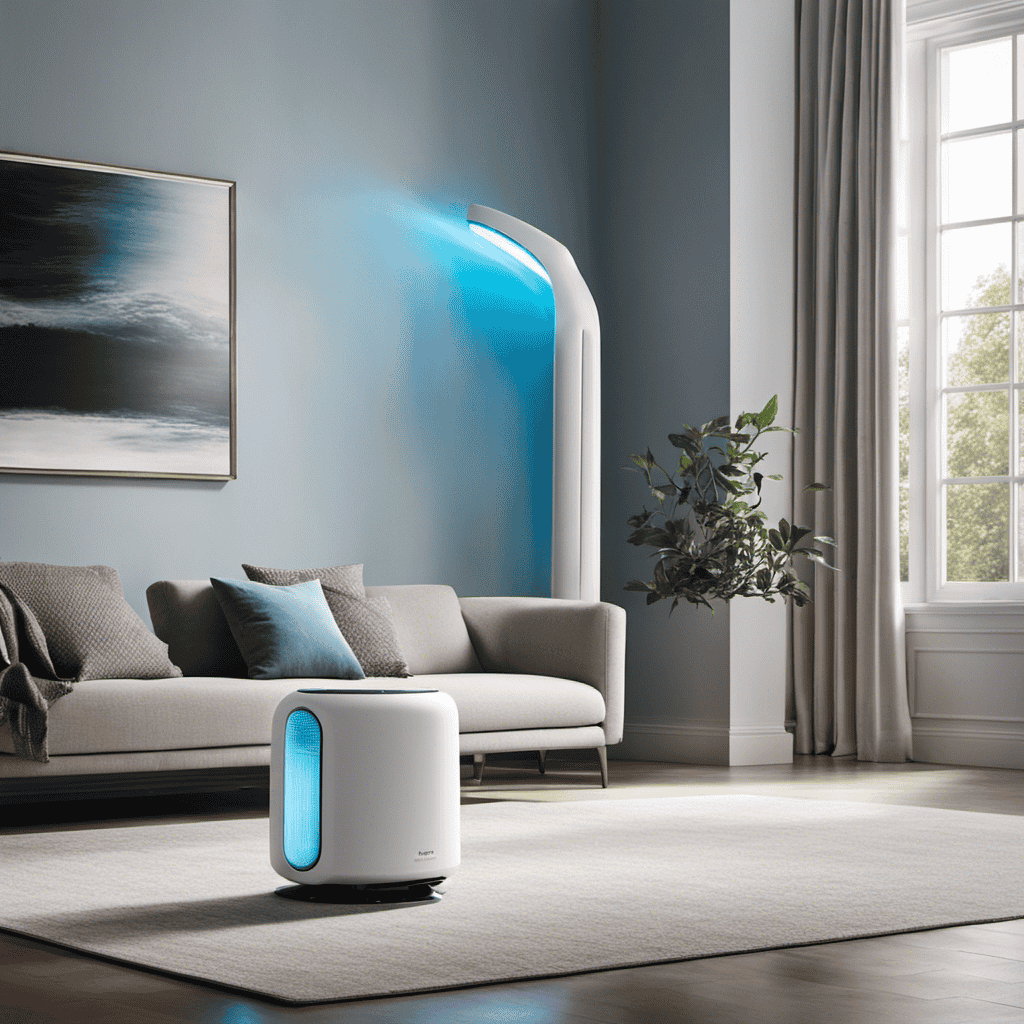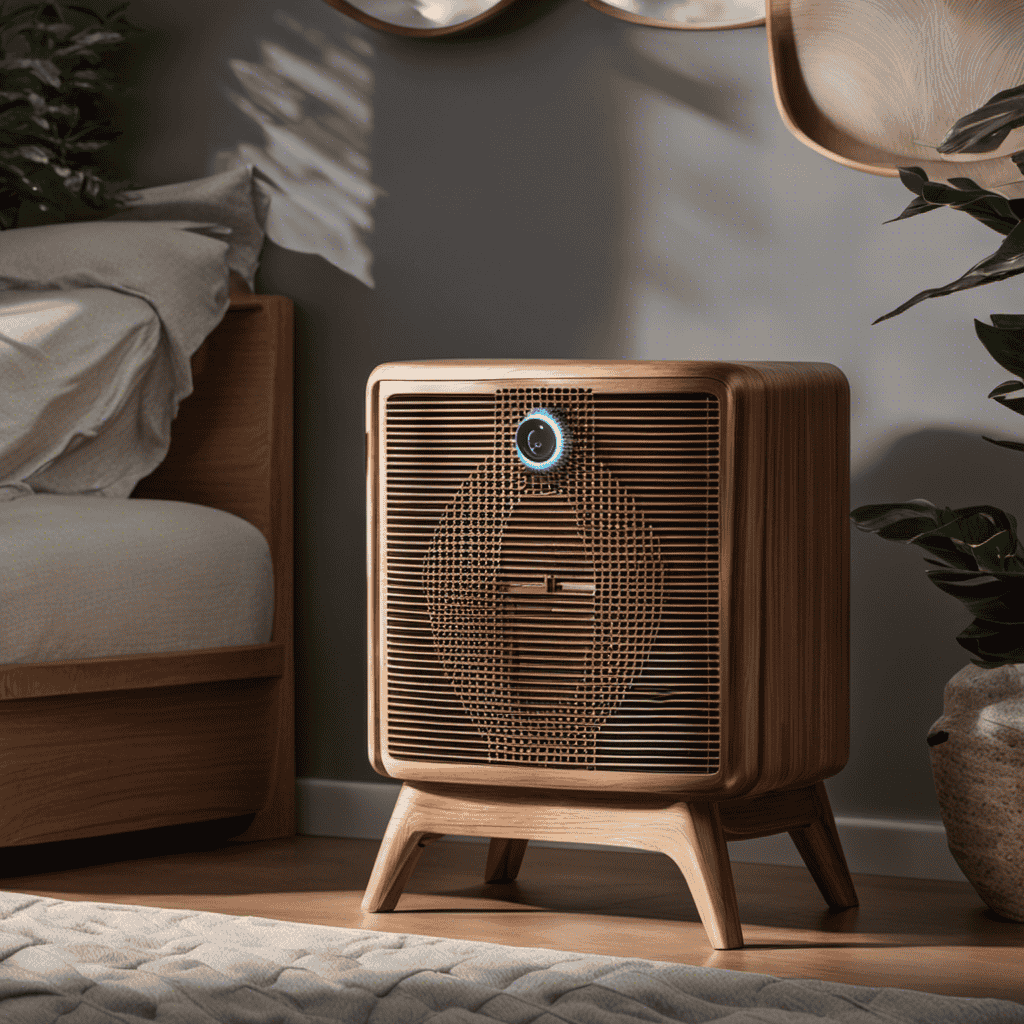As someone who is passionate about indoor air quality, I have frequently pondered the question: which is more effective in enhancing the air quality in my home, an air purifier or a dehumidifier?
In this article, we’ll explore the benefits of both options and consider the factors to keep in mind when making a decision.
We’ll delve into how an air purifier enhances indoor air quality and how a dehumidifier helps combat humidity issues.
Additionally, we’ll compare the costs of these appliances to help you determine which option is right for you.
Key Takeaways
- Air purifiers remove allergens and pollutants from indoor air, improving air quality and reducing allergies and asthma symptoms.
- Dehumidifiers control humidity levels in the home, preventing mold and mildew growth and creating a healthier living environment.
- Air purifiers are generally more energy-efficient and require minimal maintenance compared to dehumidifiers.
- The choice between an air purifier and a dehumidifier depends on specific needs and budget considerations.
Benefits of an Air Purifier
An air purifier can help improve indoor air quality by removing allergens and pollutants. It is an essential device for those who suffer from allergies or respiratory conditions.
One of the key benefits of an air purifier is its ability to control humidity levels in the home. Excessive humidity can lead to the growth of mold and mildew, which can trigger allergies and respiratory problems. By incorporating humidity control features, air purifiers can help maintain optimal humidity levels, creating a healthier and more comfortable living environment.
Additionally, air purifiers use various air purification techniques, such as HEPA filtration, activated carbon filters, and UV-C light, to effectively remove airborne allergens, dust, pet dander, and other pollutants. These techniques ensure that the air you breathe is clean and free from harmful particles.
Advantages of a Dehumidifier
You’ll love the advantages of using a dehumidifier in your home.
Dehumidifiers are devices that help reduce the moisture levels in the air, providing several benefits for your health and overall well-being.
One of the main advantages of dehumidifiers is their ability to prevent the growth of mold and mildew, which thrive in humid environments and can cause respiratory issues and allergies.
By reducing humidity, dehumidifiers also help alleviate symptoms of asthma and other respiratory conditions.
Additionally, they can help protect your furniture and other belongings from excess moisture damage.
Dehumidifiers are also energy-efficient and relatively easy to maintain.
Now that you understand the advantages of dehumidifiers, let’s explore the factors to consider when choosing an air purifier.
Factors to Consider When Choosing an Air Purifier
When considering an air purifier, it’s important to think about the size of the room you want to purify. Here are three key factors to consider:
-
Room Size: Air purifiers come in different sizes and have varying coverage capacities. It’s crucial to choose one that can effectively purify the air in the specific room you intend to use it in. A larger room may require a more powerful air purifier.
-
Humidity Control: Some air purifiers are equipped with built-in humidity control features. If you live in a humid climate or struggle with excessive moisture in your home, opting for an air purifier with this capability can help maintain optimal humidity levels and prevent mold growth.
-
Filter Replacement: Air purifiers typically use filters to trap pollutants and allergens. It’s important to consider the cost and frequency of filter replacements. Some air purifiers have filters that need to be replaced more often than others, so factoring in ongoing filter replacement costs is essential.
Considering these factors will help you make an informed decision when choosing an air purifier.
Now, let’s delve into the factors to consider when choosing a dehumidifier.
Factors to Consider When Choosing a Dehumidifier
When choosing a dehumidifier, there are two important factors to consider: humidity level requirements and room size considerations.
The humidity level requirements refer to the specific moisture level that needs to be maintained in the room, which can vary depending on factors such as climate and personal preference.
Room size considerations are important because the capacity of the dehumidifier should match the size of the room in order to effectively remove excess moisture.
Humidity Level Requirements
Maintaining the ideal humidity level is crucial when deciding between an air purifier and a dehumidifier. Humidity level monitoring is essential for a healthy indoor environment. Here are three key points to consider:
-
Health benefits: High humidity levels can lead to mold growth, which can trigger allergies and respiratory problems. A dehumidifier helps reduce excess moisture, preventing these issues and improving indoor air quality. On the other hand, an air purifier filters out airborne pollutants like dust, pollen, and pet dander, providing relief for those with allergies or asthma.
-
Ideal humidity range: The recommended humidity level for comfort and health is between 30% and 50%. A digital hygrometer can help monitor the humidity level in your home. If it consistently exceeds 50%, a dehumidifier is recommended.
-
Combination approach: In some cases, using both an air purifier and a dehumidifier can provide the best results. By reducing humidity and purifying the air simultaneously, you can create a healthier and more comfortable living space.
Room Size Considerations
To determine the appropriate appliance for your room, measure the size and consider the square footage when choosing between an air purifier and a dehumidifier. Room size limitations and energy efficiency considerations play a crucial role in making the right choice. An air purifier is typically more suitable for smaller rooms, while a dehumidifier is ideal for larger spaces. It is important to match the appliance to the room size to ensure optimal performance. To help you better understand the differences, here is a table comparing the room size limitations and energy efficiency considerations of air purifiers and dehumidifiers:
| Air Purifier | Dehumidifier | |
|---|---|---|
| Room Size | Small | Large |
| Limitations | Limited | Spacious |
| Energy Usage | Low | Moderate |
| Efficiency | High | High |
| Noise Level | Low | Moderate |
How an Air Purifier Improves Indoor Air Quality
When it comes to improving indoor air quality, two key factors to consider are airborne allergen removal and odor elimination capabilities.
Air purifiers are designed to effectively remove allergens such as dust, pollen, pet dander, and mold spores from the air, helping to reduce the risk of allergic reactions.
Additionally, many air purifiers are equipped with filters or technologies that can eliminate unpleasant odors, leaving the air in your home fresh and clean.
Airborne Allergen Removal
If you’re looking to remove airborne allergens, an air purifier is a great option for you. Air purifiers are designed to filter out particles and pollutants from the air, including allergens like pollen, dust mites, and pet dander.
Here are three reasons why air purifiers are effective in removing airborne allergens:
-
HEPA Filters: Air purifiers equipped with High-Efficiency Particulate Air (HEPA) filters can capture particles as small as 0.3 microns with 99.97% efficiency. This means they can effectively trap allergens and prevent them from circulating in the air.
-
Activated Carbon Filters: Many air purifiers also include activated carbon filters, which can absorb odors and chemicals that may trigger allergies. These filters can help eliminate unpleasant smells and irritants from the air.
-
Air Circulation: Air purifiers work by continuously circulating the air in a room, ensuring that allergens are constantly being filtered out. This helps maintain clean and allergen-free air throughout your living space.
While air purifiers are effective at removing airborne allergens, it’s important to note that they do not address the root cause of allergies. For that, a dehumidifier can be beneficial. Dehumidifiers help reduce moisture levels in the air, limiting the growth of mold and dust mites, which are common allergens. By controlling humidity, dehumidifiers can provide additional health benefits and complement the effectiveness of air purifiers in creating a healthier indoor environment.
Odor Elimination Capabilities
You’ll be pleased to know that activated carbon filters in air purifiers can effectively absorb odors, ensuring that your living space smells fresh and clean.
Activated carbon filters in air purifiers are highly effective in eliminating pet odors and removing smoke smells from your home. These filters work by trapping odor-causing molecules in their porous structure, preventing them from circulating in the air. The activated carbon has a large surface area that allows for maximum contact with the odorous particles, effectively neutralizing them. This technology is backed by scientific research and has been proven to be successful in eliminating a wide range of odors.
When it comes to pet odors, activated carbon filters can significantly reduce the unpleasant smells caused by pets. Whether it’s urine, feces, or general pet odors, the filters can absorb and trap the odor molecules, leaving your home smelling fresh and clean.
Additionally, if you have smoke smells in your home from cooking or tobacco smoke, air purifiers with activated carbon filters can help eliminate those odors as well. The carbon filters are designed to capture and neutralize the volatile organic compounds (VOCs) present in smoke, effectively removing the unpleasant smell.
How a Dehumidifier Helps With Humidity Issues
A dehumidifier helps control humidity levels in the air, making it more comfortable to breathe. Here are some benefits of using a dehumidifier and some maintenance tips to keep it running smoothly:
Benefits of a dehumidifier:
- Reduces mold and mildew growth: Excess humidity can create the perfect conditions for mold and mildew to thrive. A dehumidifier helps prevent their growth, which can be harmful to your health.
- Improves air quality: By reducing excess moisture in the air, a dehumidifier helps to filter out allergens and pollutants, improving the overall air quality in your home.
- Prevents musty odors: Excessive humidity can lead to musty odors in your home. A dehumidifier helps eliminate these unpleasant smells, creating a fresher indoor environment.
Maintenance tips for your dehumidifier:
- Regularly clean and replace the air filter to ensure optimal performance.
- Empty the water tank regularly to prevent overflow.
- Keep the dehumidifier in a well-ventilated area to promote airflow and prevent overheating.
In conclusion, a dehumidifier offers numerous benefits and requires regular maintenance to function effectively.
Now, let’s compare the cost of an air purifier versus a dehumidifier.
Cost Comparison: Air Purifier Vs Dehumidifier
Now let’s compare the cost of an air purifier with a dehumidifier. When considering the cost of these two devices, it’s important to take into account not only the initial purchase price but also the long-term expenses such as energy efficiency and maintenance costs.
| Factors | Air Purifier | Dehumidifier |
|---|---|---|
| Initial Purchase | Varies based on features | Varies based on capacity |
| Energy Efficiency | Generally low | Generally high |
| Maintenance Costs | Minimal | Regular filter changes |
Air purifiers tend to have a wide range of prices depending on the features they offer, such as additional filters or smart capabilities. On the other hand, dehumidifiers vary in cost based on their capacity to remove moisture from the air.
When it comes to energy efficiency, dehumidifiers are generally more efficient than air purifiers. They are designed to remove excess moisture from the air, which helps to reduce the workload on your air conditioning system and can result in lower energy bills.
In terms of maintenance costs, air purifiers usually require minimal maintenance. Most models only require periodic filter changes, which can be done easily by the user. Dehumidifiers, on the other hand, often require regular filter changes and occasional cleaning to ensure optimal performance.
Considering the initial purchase, energy efficiency, and maintenance costs, it’s important to choose the device that best suits your needs and budget.
Which Option Is Right for You: Air Purifier or Dehumidifier?
If you’re looking to improve the air quality in your home and reduce excess moisture, you may be wondering which option suits your needs and budget. Here is a comparison of the health benefits and energy efficiency of air purifiers and dehumidifiers:
-
Health benefits comparison:
Both air purifiers and dehumidifiers can contribute to a healthier indoor environment. Air purifiers work by filtering out airborne pollutants such as dust, pollen, and pet dander, which can help reduce allergies and asthma symptoms. On the other hand, dehumidifiers help control humidity levels, preventing the growth of mold and mildew, which can be harmful to respiratory health. -
Energy efficiency:
When it comes to energy efficiency, air purifiers are generally more energy-efficient compared to dehumidifiers. Air purifiers use less power to operate, especially if they have energy-saving features like adjustable fan speeds. Dehumidifiers, on the other hand, require more energy to remove excess moisture from the air.
Frequently Asked Questions
Are There Any Health Risks Associated With Using an Air Purifier or Dehumidifier?
There may be health risks associated with using an air purifier or dehumidifier, depending on factors like maintenance and individual sensitivity. It’s important to research and consider the potential benefits and drawbacks before making a decision.
Can an Air Purifier or Dehumidifier Help With Allergies or Asthma?
Both air purifiers and dehumidifiers can effectively alleviate symptoms of allergies or asthma. They work by removing allergens and moisture from the air, creating a cleaner and more comfortable environment for those with respiratory conditions.
How Often Do I Need to Replace Filters in an Air Purifier or Dehumidifier?
When should I replace the filters in my air purifier or dehumidifier? Cleaning the filters is important for maintaining optimal performance. It is recommended to replace them every 3-6 months, or as instructed by the manufacturer.
Can I Use an Air Purifier and Dehumidifier Together for Better Indoor Air Quality?
Combining an air purifier and dehumidifier can enhance indoor air quality. By removing airborne pollutants and reducing excess moisture, this duo creates a healthier environment. Improving air quality is the key goal.
Are There Any Energy-Saving Features in Air Purifiers or Dehumidifiers?
When considering air purifiers and dehumidifiers, it’s important to evaluate their energy efficiency and noise levels. Both appliances have features that can save energy and operate quietly, providing a comfortable indoor environment.
Conclusion
In conclusion, when deciding between an air purifier or a dehumidifier, it’s important to consider your specific needs and the environment you are in.
Both options have their advantages and can greatly improve indoor air quality. An air purifier is ideal for removing pollutants and allergens from the air. It can help with issues like pet dander, dust mites, and pollen, making it a good choice for those with allergies or respiratory conditions.
On the other hand, a dehumidifier helps to reduce excess moisture and prevent mold growth. It’s especially useful in areas with high humidity levels or damp basements. By removing moisture from the air, it can help prevent the growth of mold and mildew, which can cause health problems and damage to your home.
Ultimately, the choice depends on your priorities and the specific issues you are facing in your home. If you’re primarily concerned about improving air quality and reducing allergens, an air purifier may be the best choice. If you’re dealing with high humidity levels and want to prevent mold growth, a dehumidifier would be more beneficial.
In any case, it’s a good idea to do some research and consider the specific features and capabilities of different models before making a decision. This will ensure that you choose the option that best meets your needs and helps create a healthier indoor environment.

